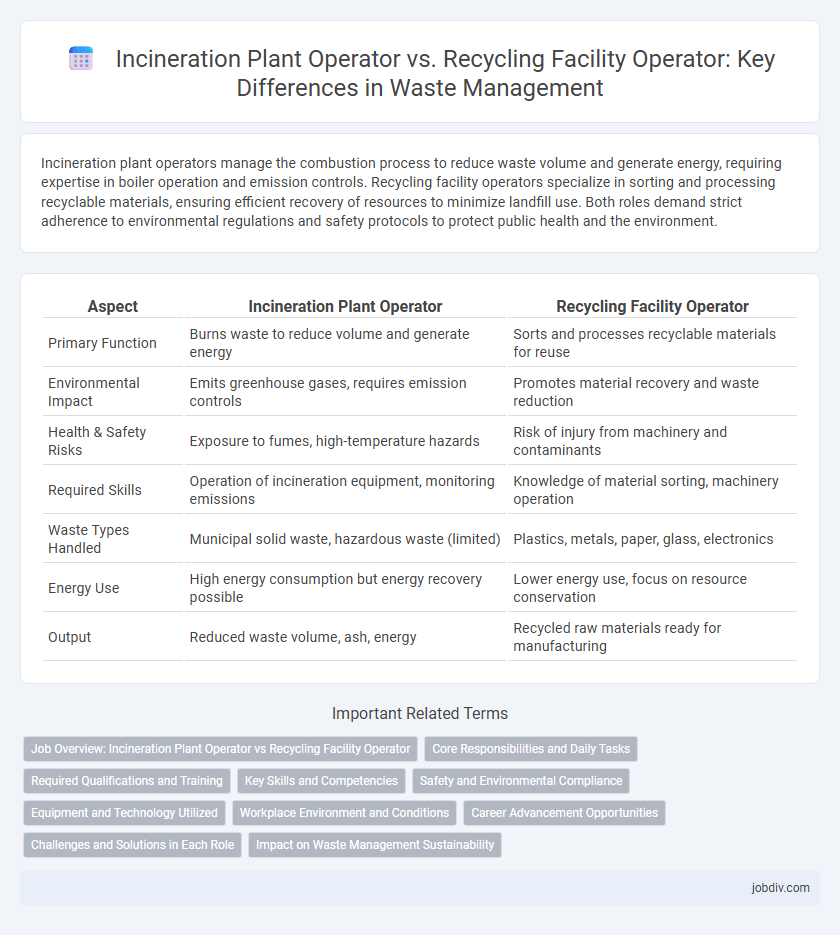Incineration plant operators manage the combustion process to reduce waste volume and generate energy, requiring expertise in boiler operation and emission controls. Recycling facility operators specialize in sorting and processing recyclable materials, ensuring efficient recovery of resources to minimize landfill use. Both roles demand strict adherence to environmental regulations and safety protocols to protect public health and the environment.
Table of Comparison
| Aspect | Incineration Plant Operator | Recycling Facility Operator |
|---|---|---|
| Primary Function | Burns waste to reduce volume and generate energy | Sorts and processes recyclable materials for reuse |
| Environmental Impact | Emits greenhouse gases, requires emission controls | Promotes material recovery and waste reduction |
| Health & Safety Risks | Exposure to fumes, high-temperature hazards | Risk of injury from machinery and contaminants |
| Required Skills | Operation of incineration equipment, monitoring emissions | Knowledge of material sorting, machinery operation |
| Waste Types Handled | Municipal solid waste, hazardous waste (limited) | Plastics, metals, paper, glass, electronics |
| Energy Use | High energy consumption but energy recovery possible | Lower energy use, focus on resource conservation |
| Output | Reduced waste volume, ash, energy | Recycled raw materials ready for manufacturing |
Job Overview: Incineration Plant Operator vs Recycling Facility Operator
Incineration Plant Operators manage high-temperature combustion processes to reduce waste volume and generate energy, ensuring compliance with environmental regulations. Recycling Facility Operators oversee the sorting, processing, and preparation of recyclable materials for reuse, emphasizing material recovery and contamination control. Both roles require technical expertise and adherence to safety standards, but focus on different methods of waste management--thermal treatment versus material diversion.
Core Responsibilities and Daily Tasks
Incineration plant operators manage the combustion processes, controlling machinery to safely reduce waste volume and generate energy while monitoring emissions to comply with environmental regulations. Recycling facility operators sort, process, and prepare materials for reuse, ensuring contamination is minimized and separation technologies function efficiently. Both roles require equipment maintenance and adherence to safety protocols but differ in focus: incineration emphasizes thermal treatment and emission control, while recycling centers prioritize material recovery and quality sorting.
Required Qualifications and Training
Incineration plant operators typically require specialized training in combustion technology, environmental regulations, and safety protocols, often necessitating certification or licensure depending on regional mandates. Recycling facility operators need knowledge in material sorting, equipment handling, and waste management practices, with qualifications that may include vocational training or associate degrees in environmental science or industrial operations. Both roles demand strong understanding of environmental compliance and operational safety, but incineration operators focus more on hazardous emission control while recycling operators emphasize resource recovery and contamination prevention.
Key Skills and Competencies
Incineration Plant Operators require strong technical skills in combustion control, emissions monitoring, and waste-to-energy conversion processes, ensuring compliance with environmental regulations and maintaining plant safety. Recycling Facility Operators must excel in material sorting, contamination identification, and knowledge of recycling technologies to efficiently process and repurpose waste streams. Both roles demand problem-solving abilities, attention to detail, and adherence to strict safety protocols to optimize waste management and environmental protection.
Safety and Environmental Compliance
Incineration plant operators strictly adhere to emission control regulations and maintain continuous monitoring systems to minimize air pollutants, ensuring compliance with environmental safety standards. Recycling facility operators prioritize proper sorting and handling of materials to prevent contamination and occupational hazards, adhering to waste management protocols that promote environmental sustainability. Both roles require comprehensive training in safety procedures and regulatory frameworks to mitigate health risks and environmental impact effectively.
Equipment and Technology Utilized
Incineration plant operators manage advanced combustion systems designed to reduce waste volume and generate energy, utilizing equipment such as furnaces, boilers, and emissions control technologies like scrubbers and filters. Recycling facility operators employ sorting machines, conveyors, balers, and optical scanners to efficiently separate and process recyclable materials for reuse. Both roles require proficiency with specialized technology tailored to waste treatment processes, but incineration emphasizes thermal processing while recycling focuses on material recovery and segregation.
Workplace Environment and Conditions
Incineration plant operators work in high-temperature, often hazardous environments requiring strict adherence to safety protocols to manage toxic emissions and potential equipment malfunctions. Recycling facility operators typically handle varied materials in less extreme conditions but face repetitive physical tasks and exposure to dust and noise. Both roles demand vigilance and protective gear, yet incineration operators encounter more intense environmental risks due to combustion processes.
Career Advancement Opportunities
Incineration Plant Operators often experience career advancement through skill specialization in combustion technology and emissions control, enabling roles in plant management or environmental compliance. Recycling Facility Operators gain opportunities by mastering material recovery processes and waste sorting technologies, which can lead to supervisory or sustainability coordinator positions. Both careers offer pathways into environmental engineering or regulatory agencies, driven by growing focus on waste management and sustainability practices.
Challenges and Solutions in Each Role
Incineration plant operators face challenges such as managing toxic emissions and ensuring compliance with strict environmental regulations, requiring advanced filtration systems and continuous monitoring technology to mitigate pollution. Recycling facility operators struggle with contamination in incoming materials and fluctuating market demand, which can be addressed through improved sorting technologies and stronger supply chain partnerships. Both roles demand ongoing training and adaptation to evolving waste management technologies to optimize environmental and operational outcomes.
Impact on Waste Management Sustainability
Incineration plant operators contribute to waste management by reducing landfill volume and generating energy, yet they face criticism for emissions and resource loss. Recycling facility operators enhance sustainability by recovering materials, conserving natural resources, and lowering greenhouse gas emissions. The overall impact on waste management sustainability favors recycling, though both roles are essential in integrated waste management systems.
Incineration Plant Operator vs Recycling Facility Operator Infographic

 jobdiv.com
jobdiv.com